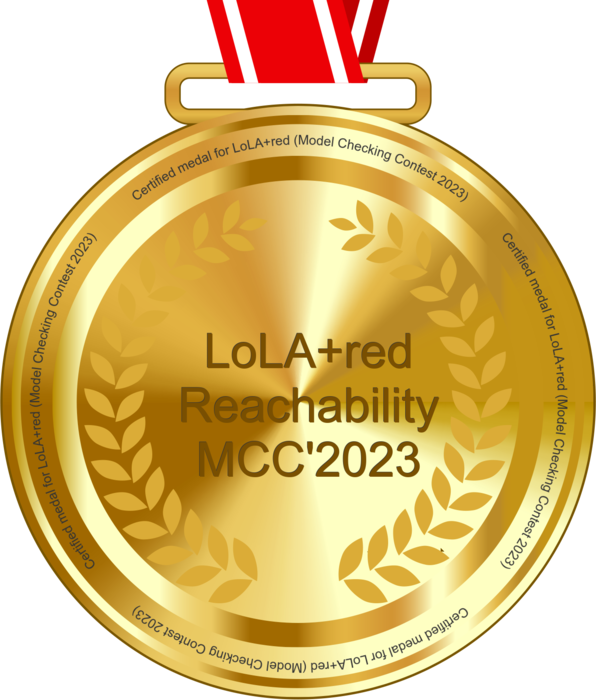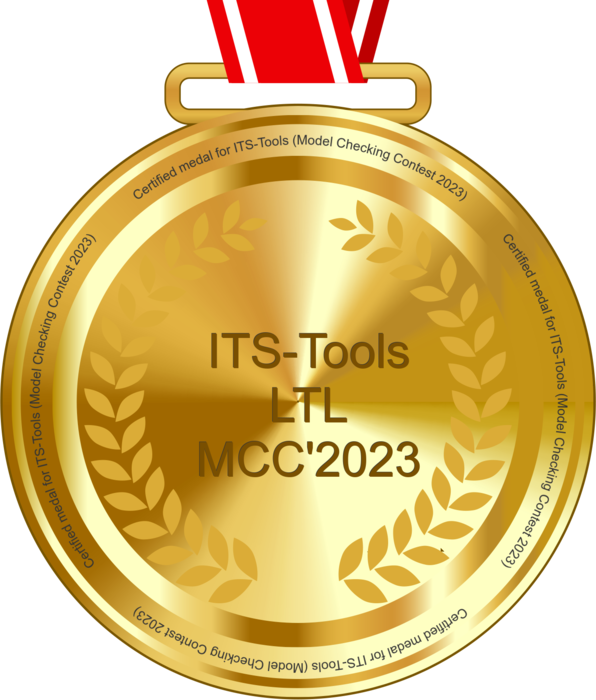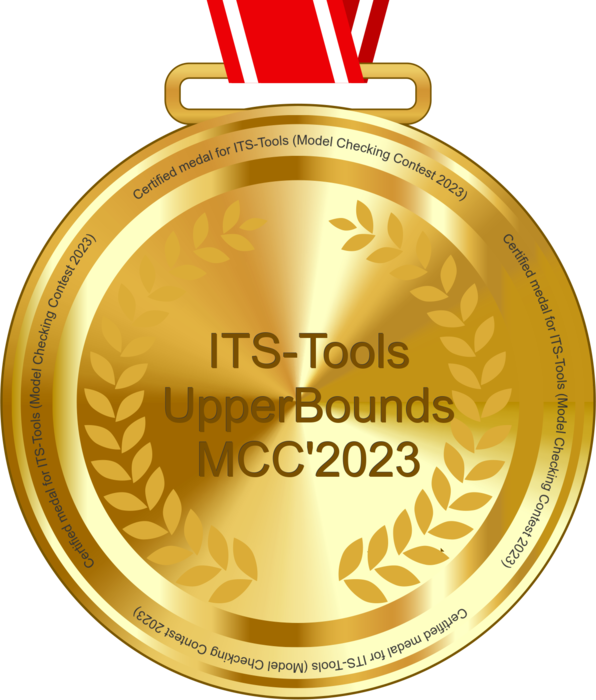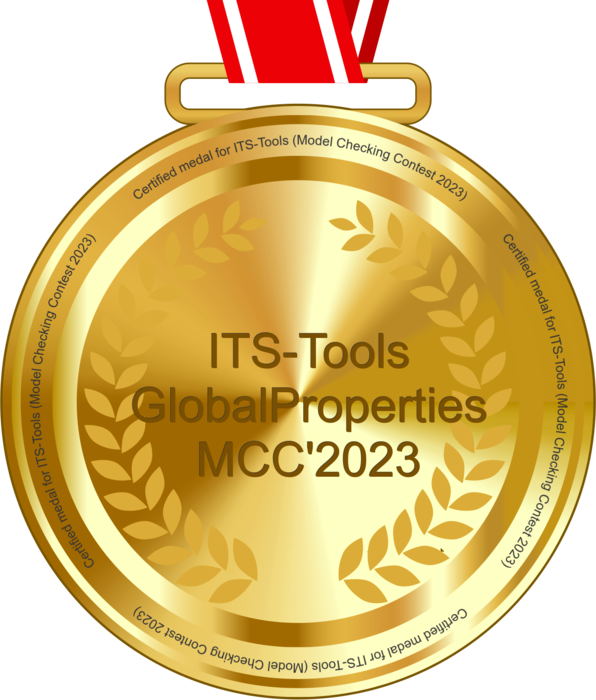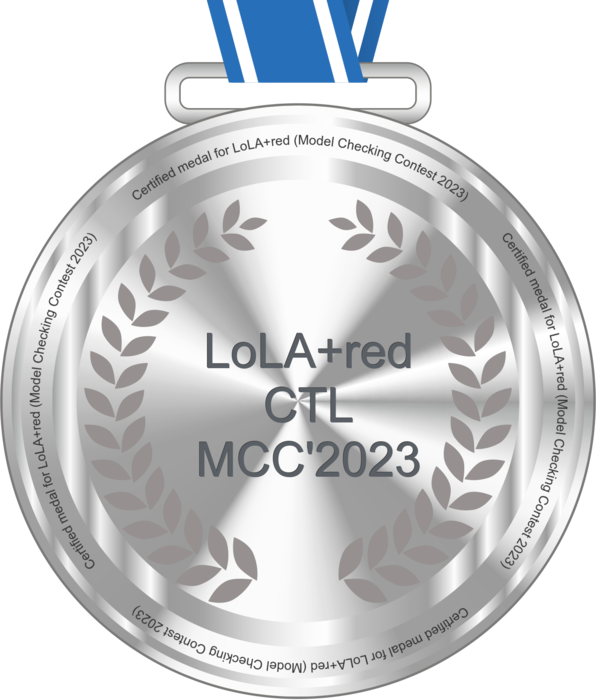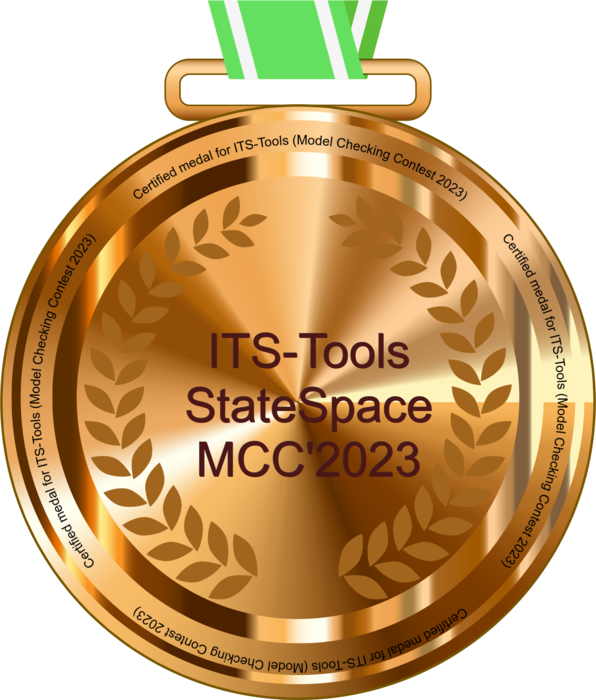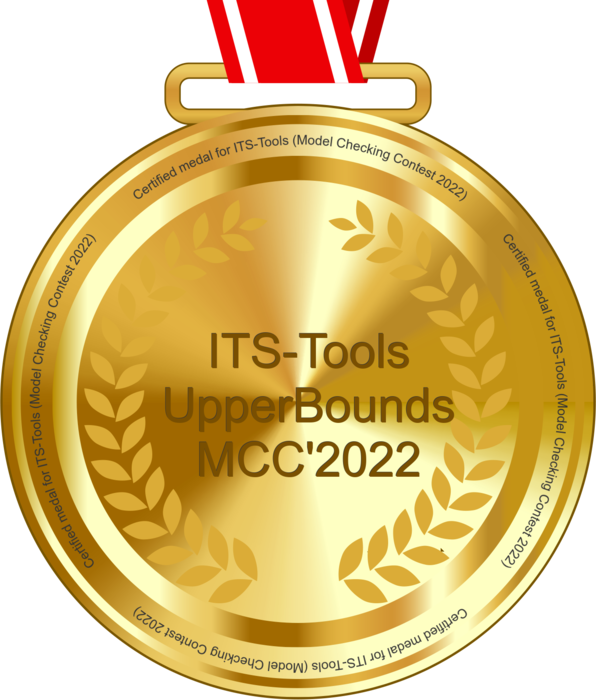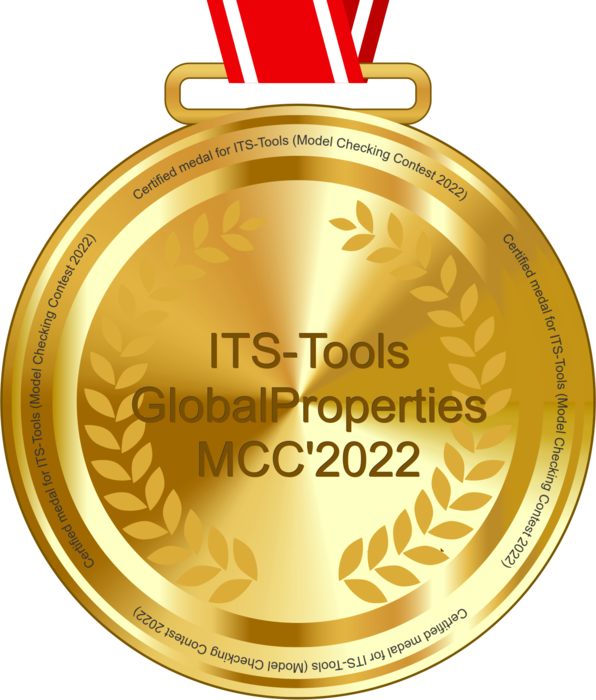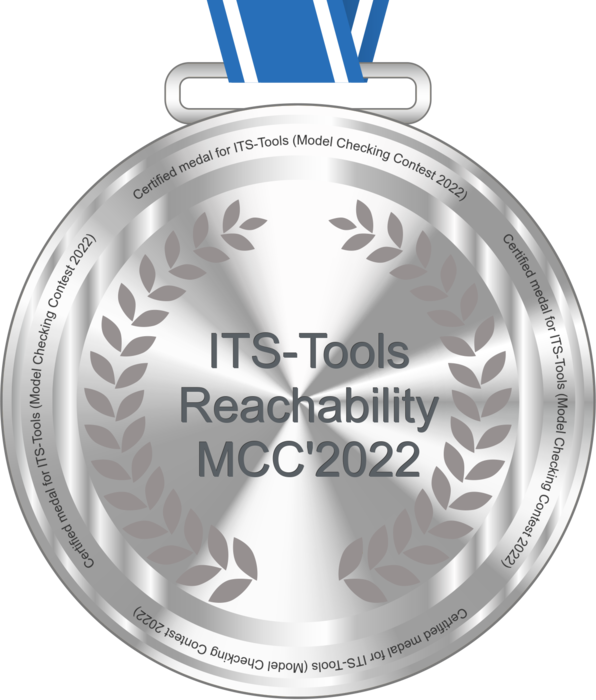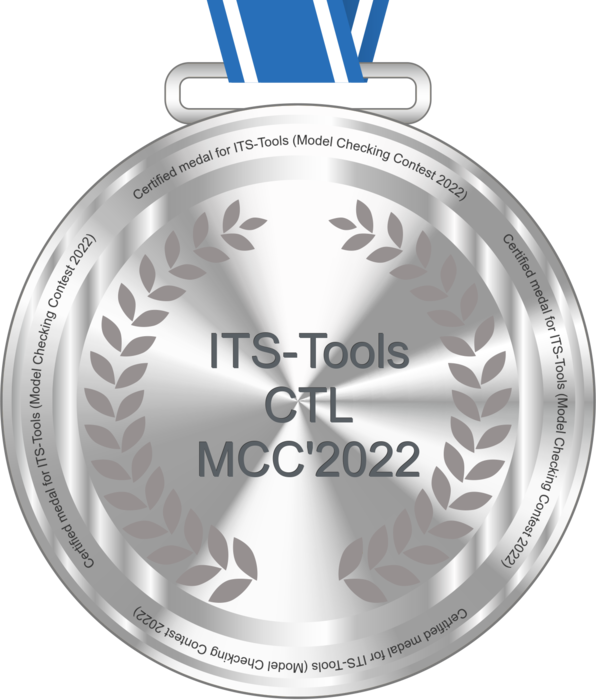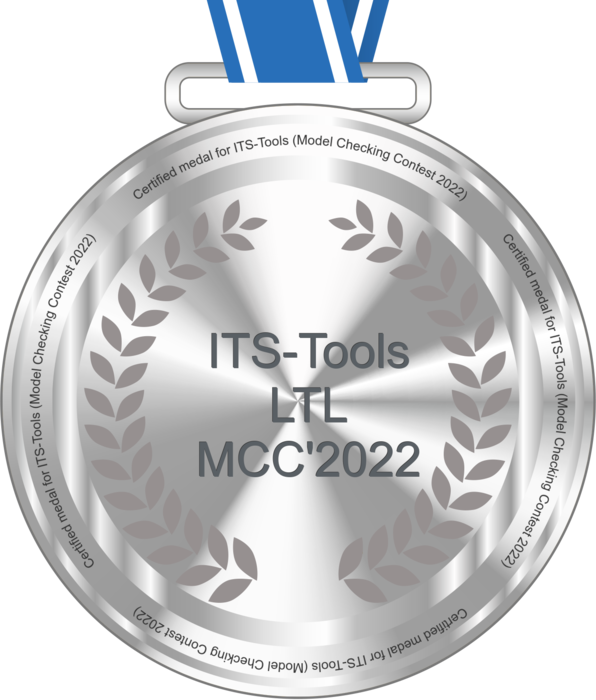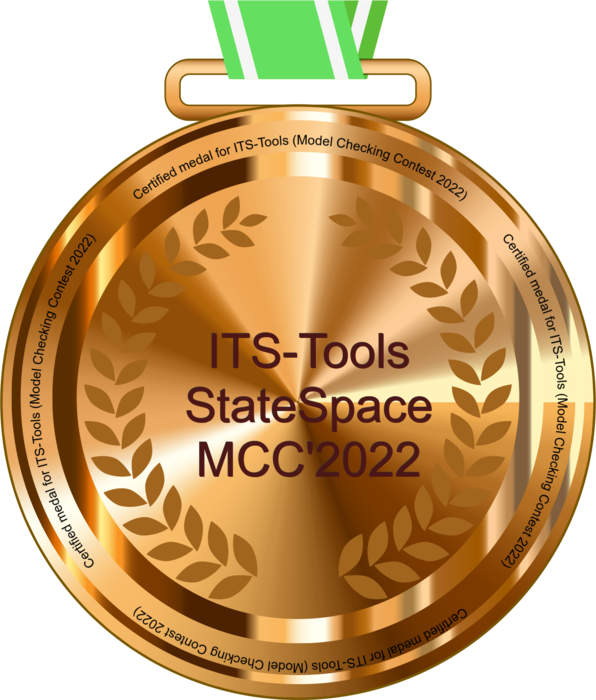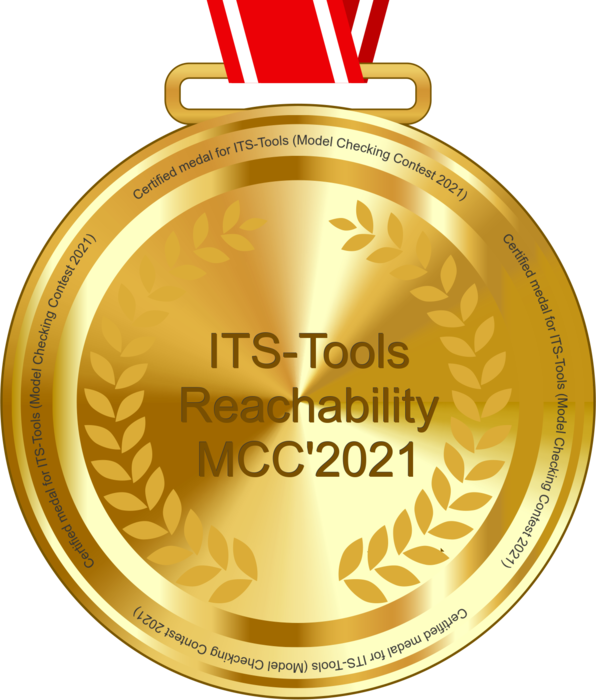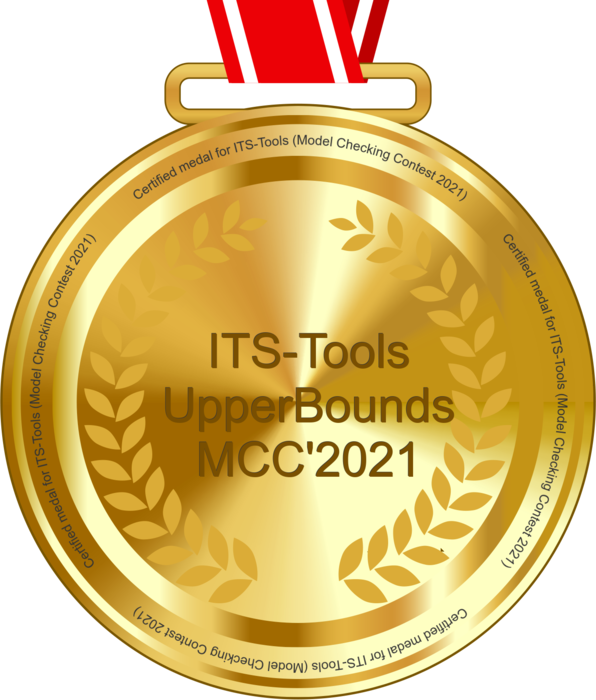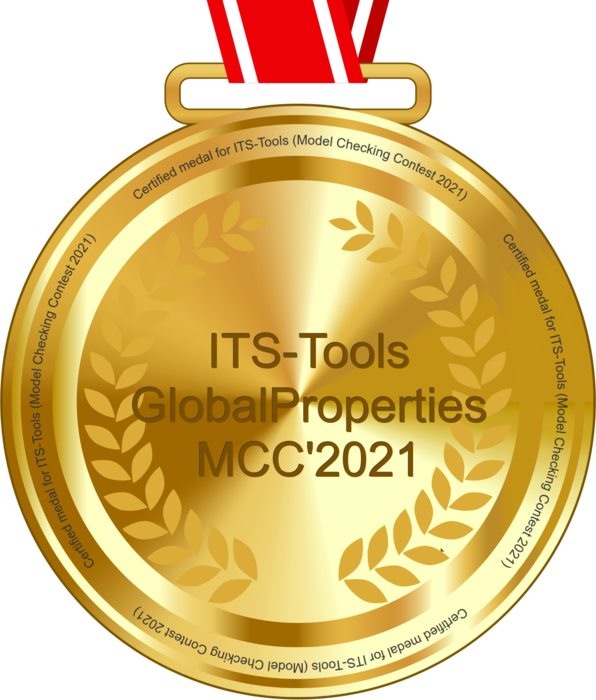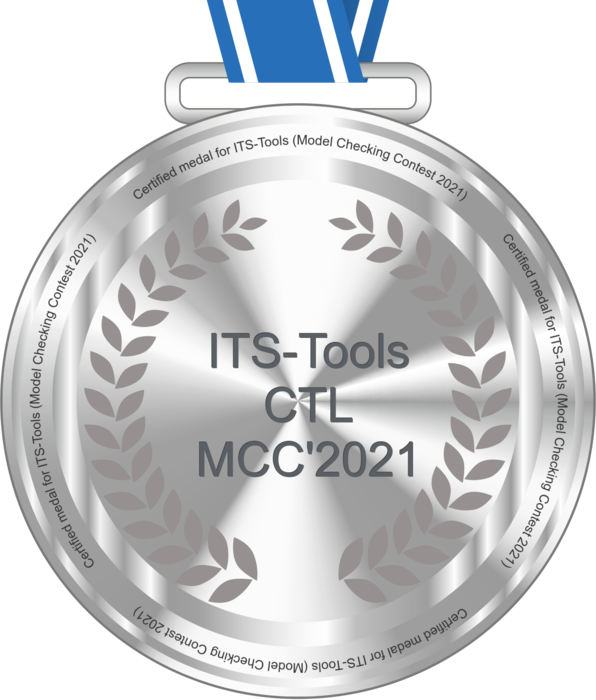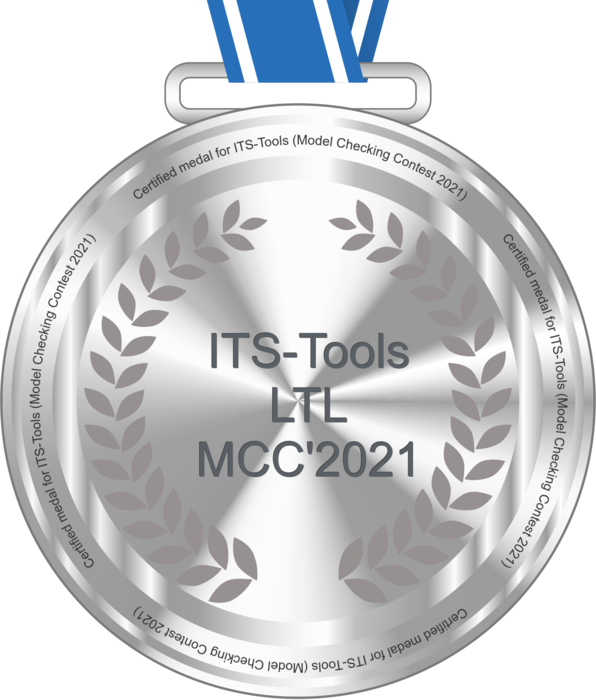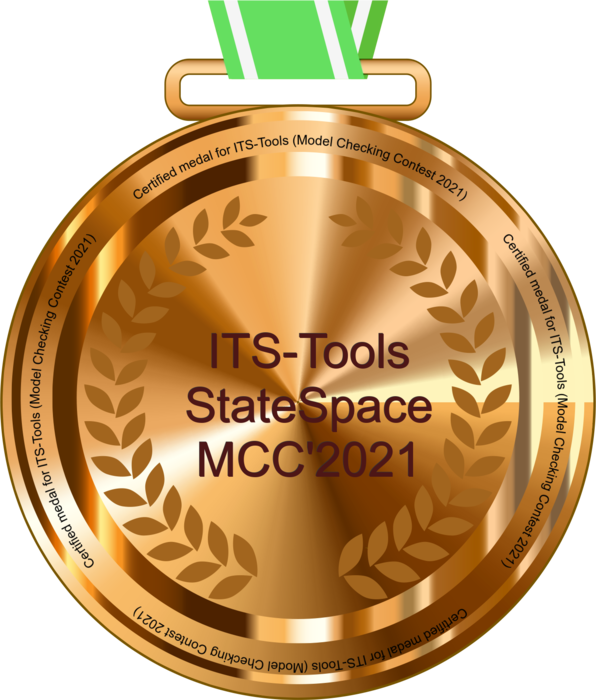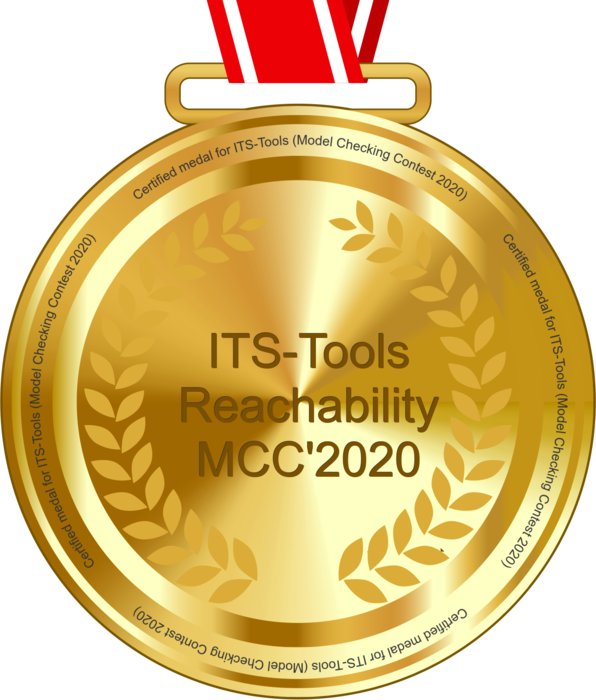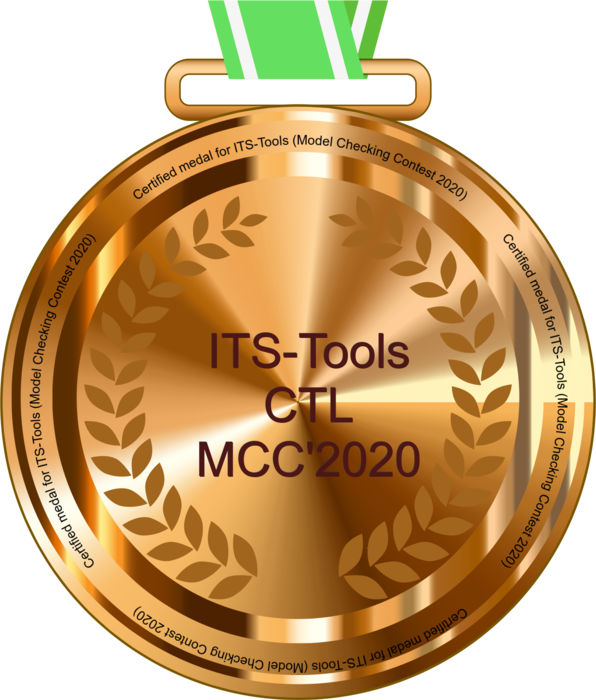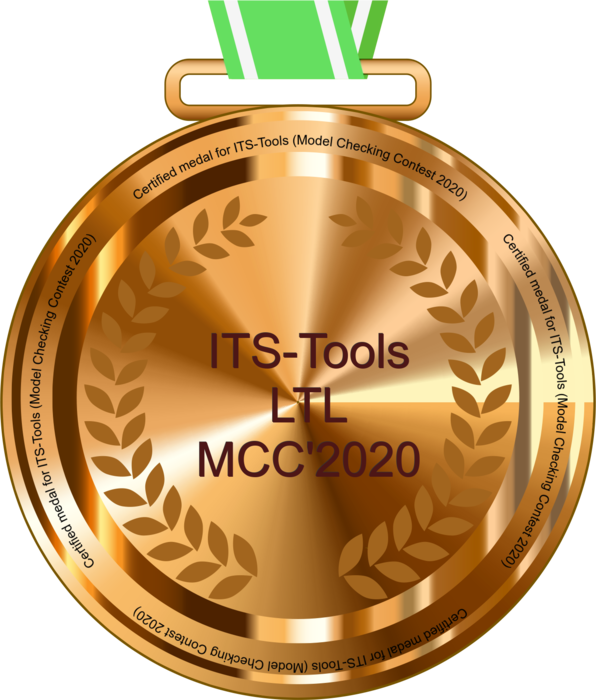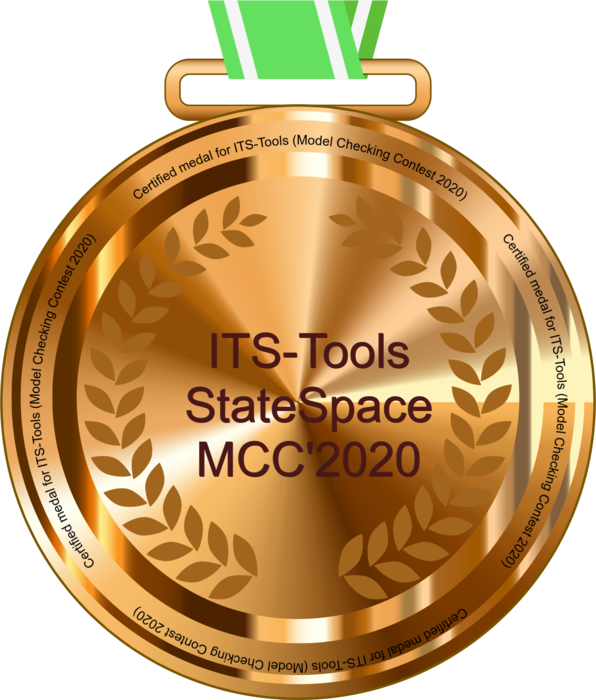This project contains :
- support for downloading and deploying ITS-tools. Simply run :
./install.sh - wrapper scripts used in the contest, in particular
BenchKit_head.shthat supports invocation of its-tools from the command line for PNMCC style queries
ITS-Tools and its family won the following awards at the Model-Checking Contest 2023 edition :
ITS-Tools thus won four out of six categories of the MCC 2023, including LTL for the first time, and was on the podium of the other categories CTL and StateSpace.
These good overall results are also due to our submission of several combination tools "+red" with ITS-Tools acting as a simplifying front-end for another engine. While only one of these tools was competing for medals in a given category, they performed very well overall. Please see the https://github.com/yanntm/MCC-drivers repository that hosts these variants.
We are also building a nice analysis site for the MCC data, that can be browsed from here : https://github.com/yanntm/MCC-analysis (or have a look at the related repository https://github.com/yanntm/MCC-analysis).
This tool won the following awards at the Model-Checking Contest 2022 edition :
It can be noted that although ITS-Tools went from Gold Reachability in 2021 to Silver in 2022, this was in fact due to a run error from the contest organizers. This is visible if you search DNC in this page or here. These DNC answers from ITS-Tools are all bugs in the MCC managed experiment, not bugs in ITS-Tools.
Since this was not diagnosed before the contest results were announced, the 2022 "Reachability" results stand with ITS-Tools in Silver and Tapaal in Gold. But Gold2021 (i.e. ITS-Tools from 2021) did get the best score on Reachability in 2022 (in front of Tapaal), and we know that ITS-Tools 2022 was improved with respect to 2021 so we are confident that in 2023 we will reclaim the Gold in reachability.
This tool won the following awards at the Model-Checking Contest 2021 edition :
It thus was on the podium of all categories of the contest, and outright won half of them.
This tool won the following awards at the Model-Checking Contest 2020 edition :
It also got the second place (silver ?) in the Deadlock Detection category, though in 2020 this category was merged into "GlobalProperties" (for the first time) so there is no related medal.
In pure symbolic and structural reduction mode it also participated in conjunction with Lola, as the tool ITS-Lola and won several awards. ITS-lola project lives here https://github.com/yanntm/its-lola.
The tool gathered many medals in the MCC and has been participating since the first edition. The 2020 submission is however a major landmark with new strategies described in the paper "Structural Reductions Revisited" published at PetriNets 2020.
See the contest pages for more details on the awards won for previous years.
The install.sh deploys :
- ITS-tools command line latest version for Linux, taken from it's main repository https://github.com/lip6/ITSTools
- Microsoft Z3 binaries for linux, used as our SMT solution engine, taken from their repository https://github.com/Z3Prover/z3
- LTSmin model checker, this tool is embedded in the ITSTools distribution and built here https://github.com/yanntm/LTSmin-BinaryBuilds
- Spot's executable binaries ltlfilt, ltl2tgba, autfilt to manipulate LTL properties and automata, taken from our https://github.com/yanntm/Spot-BinaryBuilds repository
- GreatSPN model checker, currently only used to compute variable orderings, taken from our repository https://github.com/lip6/GreatSPN-BinaryBuild
As this tool conforms to the Model-Checking contest rules, please see the MCC instructions to see how these BenchKit_head.sh scripts are meant to be invoked, and what is expected outputs from the tool in terms of verdict reporting.
To install, simply clone this repository and run install.sh script. This build is Linux specific as these are the conditions in the contest.
To analyze a model you need : a model.pnml Petri net and an Examination.xml property file in the current working directory.
Then define the environment variables BK EXAMINATION (to one of ReachabilityDeadlock,UpperBounds,ReachabilityCardinality,ReachabilityFireability,LTLFireability,LTLCardinality,CTLFireability,CTLCardinality) and BK TIME CONFINEMENT (in seconds).
If you are not running in the default MCC path /home/mcc/BenchKit, also define BK_BIN_PATH to the installation folder where you ran ./install.sh.
Finally invoke BenchKit_head.sh script.
For instance, after changing directory to where a model.pnml and Examination.xml files are present,
export BK_EXAMINATION=StateSpace ; export BK_BIN_PATH=/home/ythierry/git/ITS-Tools-MCC/bin/ ; export BK_TIME_CONFINEMENT=300; export BK_INPUT=$PWD ; $BK_BIN_PATH/../BenchKit_head.sh
This tool being compliant to MCC can be tested using our MCC testing framework https://github.com/yanntm/pnmcc-tests :
Set it up like this :
git clone https://github.com/yanntm/ITS-Tools-MCC.git
cd ITS-Tools-MCC
./install.sh
git clone https://github.com/yanntm/pnmcc-tests.git
cp -r pnmcc-tests/* .
./install_oracle.sh
Then for any test in oracle/ you can run :
./run_test.pl oracle/Angiogenesis-PT-05-LTLF.out
To ensure the build is reproducible there is a Github Actions attached to this repository that runs this exact test, see https://github.com/yanntm/ITS-Tools-MCC/actions for some logs of it running.
You can pass extra flags when invoking BenchKit_head.sh that will affect the behavior of the tool.
- -rebuildPNML : at the end of the reduction phase, output a reduced model and property.
Depending on the examination lots of different things happen.
You can modify the flags that are presently passed to runeclipse.sh in the BenchKit_head.sh script :
Solution engines :
- -its responds to all examination, and uses hierarchical set decision diagrams as solution engine
- -smt only supports ReachabilityXX, and uses a BMC/Induction approach reliant on Z3
- -ltsmin supports Reachability and LTL and uses LTSmin https://ltsmin.utwente.nl/ as solution engine
Additional flags :
- -greatspnpath $BINDIR/greatspn/ -order META : these flags make the -its engine use the variable ordering suggested by GreatSPN's heuristics. See https://github.com/greatspn/SOURCES for more values of the -order flags you could use.
- -manyOrder divide the available time in slices to try several different variable orderings
Solution engines, activate as many as you wish, they run in portfolio : -its -smt -ltsmin -onlyGal
-
-its : Generates examination.gal and examination.prop/ctl/ltl, then calls ITS-tools + interprets results.
-
-smt : Generate a pair of SMT solvers running BMC/KInduction for ReachabilityXXX properties.
-
-ltsmin Generate model.c/.h + compilation to gal.so + run ltsmin + interpret results
For finer control :
- -disablePOR Partial Order Reduction is only available with ltsmin target. But computing the POR matrices can be costly, so this flag disables that. In combination with onlyGAL quickly maps pnml to .c/.h (+ gal.so if -ltsmin is set). In combination with -ltsmin, disables computation of NES/NDS/COENABLED/DNA matrices and removes flags that activate POR from ltsmin invocations.
Mostly for debug, and for further reuse of the GAL target :
- -onlyGal Builds Examination.gal/Examination.prop (like -its but without running its-reach). Builds model.c/model.h (like -ltsmin) but does not run ltsmin. If ltsmin is set, also generates gal.so (we can't compile without ltsmin headers) but still does not run ltsmin.
More options are under development to leverage other existing transformations to GAL, please ask mailto:[email protected] if you need a command-line tool that processes some of the other languages we support with ITS-tools (e.g. Uppaaal xta, Tina tpn, Divine DVE, Spin promela...).
Packaging and development by Yann Thierry-Mieg, working at LIP6, Sorbonne Université, CNRS. This project source code is released under the terms of GNU GPL v3.
